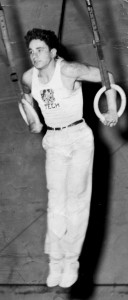Edward Foglia ’47

When I went back to Tech, I tried to make friends with some of the guys there. I didn’t talk about the war. The VA warned me not to talk about the war because I could start trouble at the school. People might see me as a killer or want to fight. I just said I was in the army. I didn’t want people thinking I was a big shot or a killer. I didn’t want any trouble.
Doc Hess was Assistant Principal. If you did anything bad, varsity guys made a tunnel with their legs and as you crawled through their legs, they swatted you. It happened to me one time for horsing around. I had aggravated my biology teacher, Mrs. Hawk. We were supposed to bring a grub to school. I brought a frog and that was what got me in trouble. The teachers meant business. You had to behave. There was strict discipline. There were no lawsuits back then! We towed the line. We weren’t like the kids today. We were there to get an education Mr. Welty was the principal. He was very nice and very approachable.
We used to sit on front steps for lunch. Once in November of 1944, I was talking with a couple of guys about being soldiers. Then I said, “Let’s go!” I would have been drafted on Nov. 18, so I enlisted on Nov. 1. I was a poor swimmer and the Marine quota was filled. I didn’t know anything about planes. The Army was considered lower level. The Marines were prestigious and it was harder to get into the Marines. I went to the Draft Board in San Francisco and was accepted into the Army. From there we boarded a bus to Camp Roberts near LA. I was in the Infantry. We learned how to shoot rifles, throw grenades, run and jump and crawl. From there we went to Fort Ord in Monterey where we got our equipment. Then we went to Camp Stolman out in Contra Costa. From there, we boarded the Ernie Pyle Ferry to San Francisco and got on a ship for the Philippines and f rom there, we shipped out to Japan. We were scared. I was just a kid. They told us to watch out for the Japanese. They said they could be in the trees and they could put wires across your path.
We were supposed to be part of the land invasion of Japan, but instead of invading, bombs were dropped on Hiroshima and then on Nagasaki. The war while we were on our way over. While we waited on the ship, scientists came over to check for fall-out and then after a couple of weeks, we went into Hiroshima. A lot of the Japanese had burned skin. Some were brought here to the US, especially the girls, to be treated in hospitals. When we arrived, at first, you couldn’t see any Japanese. They were scared of us at first. We were eating K and C rations because we didn’t yet have food from the US. Our job was to occupy the place, clear the area, and help in rebuilding. When they found out I could type, I was put in the orderly room. I made out the requisitions. I had to type up all the papers to get everyone home. I was in Japan for a year and a half. I was there for Christmas in1945 and 1946 and I left in the first part of 47.
And after all that, I went back to Tech for one semester to get my high school degree.
I married for the first time in 1952 and 6 years later, my wife got cancer and died. I met my current wife at the Ali Baba Ballroom where Sid Hawk was the orchestra leader. I saw my wife and asked her to dance. Do you drink? No. Smoke? Yes, but I’ll quit. I’ll see you next week. Her family was Italian and that made it easier. I was 33 with 3 kids. She was 7 years older. She was great with the kids and they call her mom to this day. She is 94 now and we are going on 51 years of marriage.
After Tech, I went to Laney Trade for 4 years to learn painting trade and then I joined painters’ union. I became a housepainter and decorator and retired after 35 years in the trade, but I still wanted to do something. I had all my tools, so I went back to work after about a month at home on my own doing small jobs. I had a lot of business. I promised my wife I would quit when I turned 80 and I did. Now I am 87 and I am home taking care of my wife.
